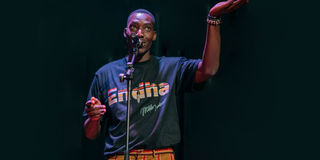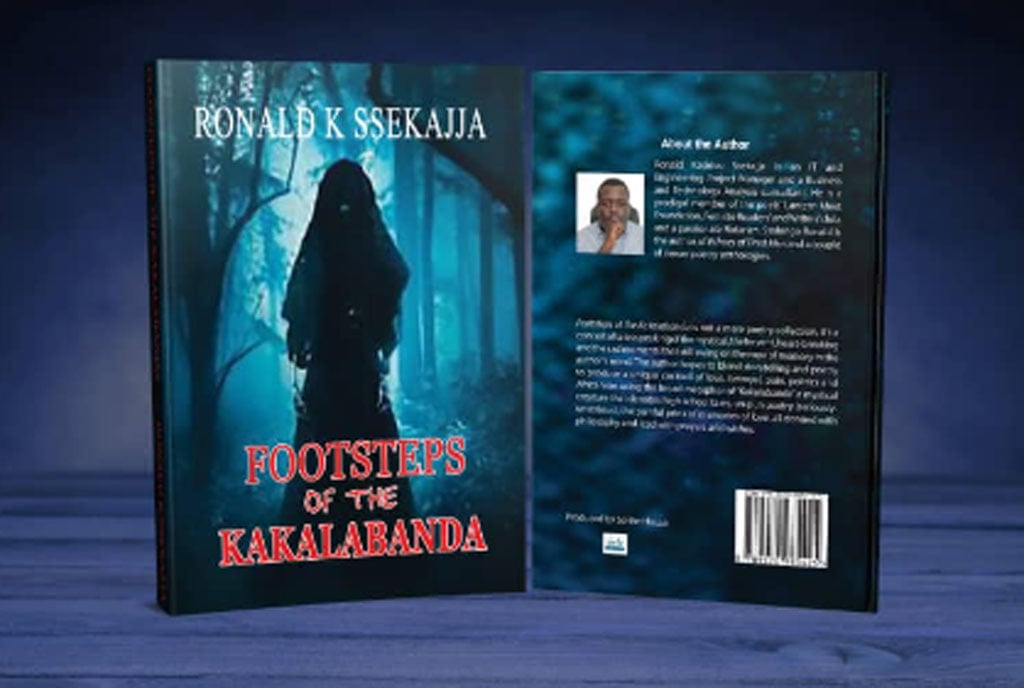Prime
Mitchy Isabirye: From Kasokoso to poetry stages

Mitchy during one of his spoken word performances. He said the best thing you can pay a poet is maximum attention.
PHOTO/COURTESY
What you need to know:
With his most recent shows aptly titled Mitchz Manifest, Mitchy Isabirye has prominently featured other spoken word artists, singers and instrumentalists, among others. Gabriel Buule caught up with him to discuss his career as a spoken word artist and social life.
Kasokoso’ Finest as he is commonly known to those in the arts circles, Godfrey Mitchy Isabirye is steadily creating a new dimension of Uganda’s poetry.
With a new EP dubbed Endha to his name, the author, writer, poet, spoken word artist and environmentalist is gaining repute with an art form that has been reluctantly embraced by Ugandans.
Mitchy is a spoken word artist who has staged three independent shows since October 2022. He has organised his shows at the National Theatre and the last two, including that on Thursday night have been at Goethe Zentum Kampala in Kamwokya.
Talk to us about the Mitchz Manifest series.
The series are about poetry shows that are geared towards creating a platform where spoken word can be appreciated and consumed with minimum disruption.
In my opinion, the best thing you can pay a poet/spoken word artist is maximum attention, so whoever chooses to attend the manifests are willing to listen, but I am not down playing the money.
In March 2022 someone contacted me to perform at Vumbula Uganda Festival and on the line-up I was supposed to come before Jose Chameleone - as in curtain raise for him.
This show at the back of mind was supposed to be what would make me, but somehow it broke me. I even had to explain to the stage manager what I do and his response was, “byebiki ebyo?” (what is that?). One takeaway from the show was people listened when I was on stage. After my performance, I walked from Uganda Museum to town and I kept wondering where I had gone wrong.
I had always wanted to have my own show but was scared, but after that performance I had to make it work. “Manifest” means something that is clear or obvious and that day I learnt that the people want to listen.
You are giving poetry a new face in Uganda, what is your special approach?
I try to view life in the same lens as any ordinary Ugandan. My craft is inspired by life experiences, so I keep it simple and relatable. It has been a long journey of self-discovery and to quote a friend “write the way you speak” and this has been the basic principle I have followed since.
You are little-known. Could this be a case of your artistic genre or people just do not understand the kind of art that you do?
You cannot force people to listen but either way I do not underestimate the audience, so I am not where I want to be but I appreciate the progress.
Why poetry and not music or other selling careers?
The calling was loud but again, I am not far away from music. Poets draw on rhythms of different musical traditions; from jazz, rap, and hip hop to folk songs and country music.
Basically the two artistic genres are related and I have actually created works with musicians such as Kenneth Mugabi, Andeleya Baguma, among others.
Why your poetry is different compared to others?
Not that different but it is beyond poetry whereby I try to blend poetry and music.
Poetry and music have been intertwined for thousands of years. In antiquity, poems were often sang. The first lyric poets in ancient Greece performed their work to, accompanied by the lyre, and the oldest anthology of Chinese poetry, the Shijing, was a collection of songs.

Left to right: KQ Hub Africa founder Wabwire, Mitchy and rapper Ruyonga at one of the poetry nights. PHOTO/
COURTESY
Is it difficult to have a successful poetry career in Uganda?
I know people who live off poetry and it is their bread and butter. So, there is no template to making a reasonable career but all I can say is that talent alone is not enough.
When you focus more on the money, poetry can sometimes be depressing but at the same time it can be healing if approached otherwise.
What plans do you have to make sure that your art penetrates communities?
I stepped out of the poetry communities and I have been to other arts forms trying to perform such that more people can appreciate the art, I can get more collaborations with different artists and I am also trying to put my works in digital formats such that they are accessed online.
What challenges have you faced in the arts industry?
The rate cards. People do not want to recognise it as a paid platform and sometimes I get curved.
All I can say these small steps matter and the journey to being an artist is not a smooth one. I am happy we are making progress.
Do you come from a literary background?
Unfortunately, no. I started writing poetry just after hitting my teen years and quickly fell in love with the artistry, wordplay, and rhythmic challenge of crafting poems.
Do you have to read poetry technique books to write a good poem?
There are times when it may be useful to study a particular form of sonnet, ode among others but the only two essential elements are to read and poetry write poetry.
However, if you are not able to take things in from the poetry itself, technique books may help in addition to talent.
What writers did you enjoy reading as a child?
I did not read any literary books until about five years ago. Reading is a culture, so I am just slowly adopting it but I make it a point to read most of the literary works locally, internationally, at least 20 percent.
Notably I have read Kagayi Ngobi, Ssebo Lule, Berverly Nambooze, Ssekajja Kasirivu, Okot p’Bitek, Jennifer Nansubuga Makumbi, Wole Soyinka, Chimamanda to mention but a few. However, I am a good listener and I still listen to Paul Kafeero’s entire album. I rate him highly as a writer.
How do your poems develop?
I follow no chronological order but all I know is I listen a lot, have plenty of conversations and a strong visual memory, so as I walk, I focus more on the small details. Some poems take days, some months, some are impromptu but I always walk around with a notebook in my backpack.
I keep my notebook open during the night and when an idea pops in my mind, I wake up and note it down. Then after writing I share with a few friends for advice. I then perform the poems at some poetry events before taking them to main stages. So, the poems go through a whole incubation process, although lately the hardest part is memorising.
What advice can you give someone who wants to write and publish poetry?
Start now but make sure that you first create individual poems and find space to perform so that you can create your audience. Eventually when you have built a track record, you may be able to interest publishers of poetry books and booking agents.
Do you think you have to figure out the meaning of a poem, or should it just be felt?
There is a whole spectrum and whatever suits you as a writer or listener is up to you.
Do you have any funny stories or anecdotes about your experiences as a poet that you would like to share?
My mom pronounces poem the way it is written. “Poyemu”. I just find it funny.
Do you think poetry is still relevant in today’s society?
Life would be empty without poetry; you will realise that poetry can be a powerful tool of communication and for academic purposes it helps learners improve their literacy.
In societies where people are censored, it allows writers to express their emotions and share their grievances by using words to connect.
Poetry is so important because it helps us understand and appreciate the world around us. Poetry’s strength lies in its ability to shed light on the world, so the truth sneaks up on you.
Do personal experiences also influence the themes of your poems? If so, to what extent?
To a larger extent for most of pieces about social issues, these are personal. For love poems I approach them more with a creative mindset and rarely do I write from the heart. But most of the inspirations are life experiences.
Do you consider yourself primarily a poet?
I just want to experiment, so I do not limit myself as long as the energy is right. I write in other genres as well. However, what I do is to create poetry in varying forms.
State of poetry in Uganda?
Poetry in Uganda has come a long way, from the early days of Makerere arts Professor Rose Mbowa to modern times of Lantern Meet of Poets that introduced audiences to performers such as Surumani Manzi, Jason Ntaro and Kagayi Ngobi, among others.
Currently, Poets who include Lus the Poet, Kagayi Ngobi, Hawa Kimbugwe and Mitchy Isabirye are tirelessly taking poetry to the audience through a series of shows in art centres schools, theatres among others.
Poetry as an art sought to communicate and through the different poets of the day, they communicated; some of the content was civic while the rest was about daily situations such as relationships, family, religion and culture.
Who is Mithy Isabirye?
Godfrey Mitch Jr. Isabirye is an author, writer, poet, spoken word artist, and environmentalist. He started his craft in late 2017 but professionally in early 2018, performing on a couple of poetry platforms and stages in and out of Kampala.
His inaugrural poetry performance was at a Poetry platform dubbed Tontoma supported by 32°Arts Trust. He later moved to Kelele, a poetry platform organised by students from Makerere University Kampala an avenue that allowed students to express themselves.
In 2018 he worked with Spoken Word Uganda that used to host monthly poetry slams and later that year he won his first poetry slam.
Around April 2018, he was chosen among the few poets to perform at an event organised by the Pan African Women Association to commemorate the demise of the Late Winnie Madikizela Mandela.
He has performed at StoneFest 2022, Vumbula Uganda Festival 2022, Afrozilla Festival 2022 and he released his first EP, dubbed Endha, in June 2022 and currently focused on producing his own poetry show called Mitchz Manifest, which happens every after four months.




